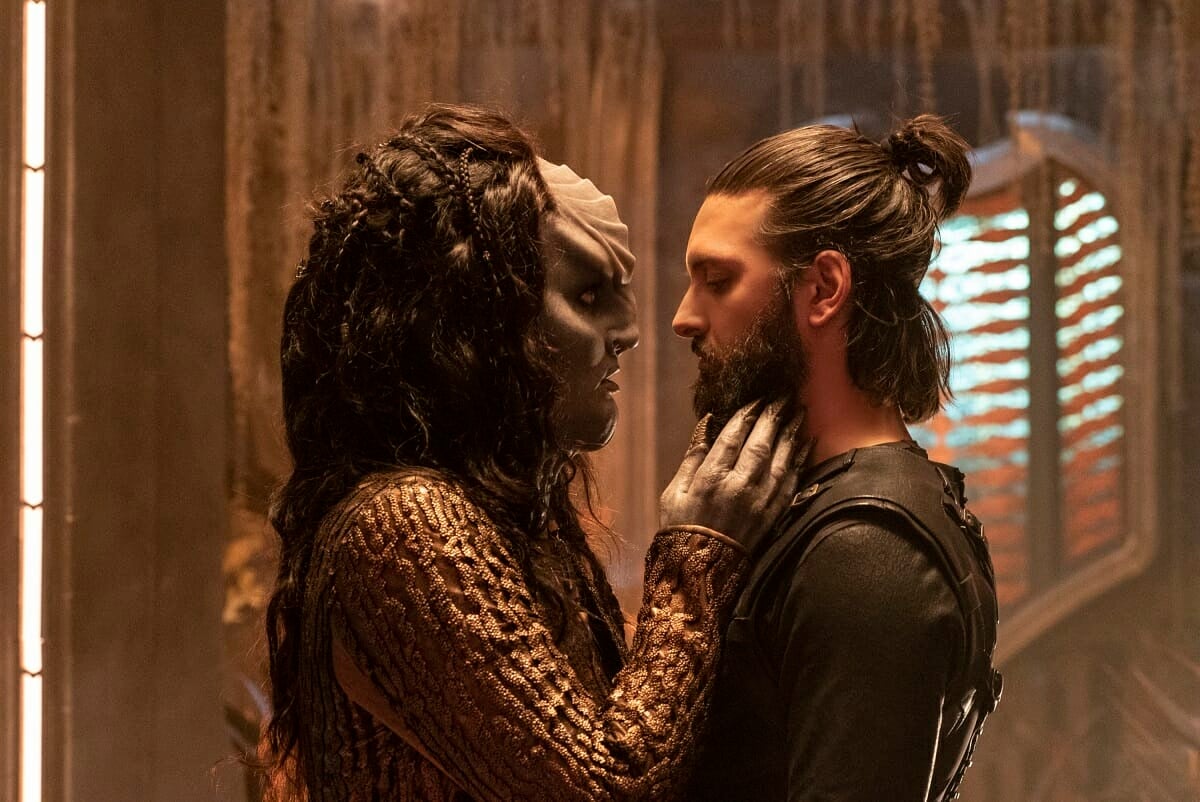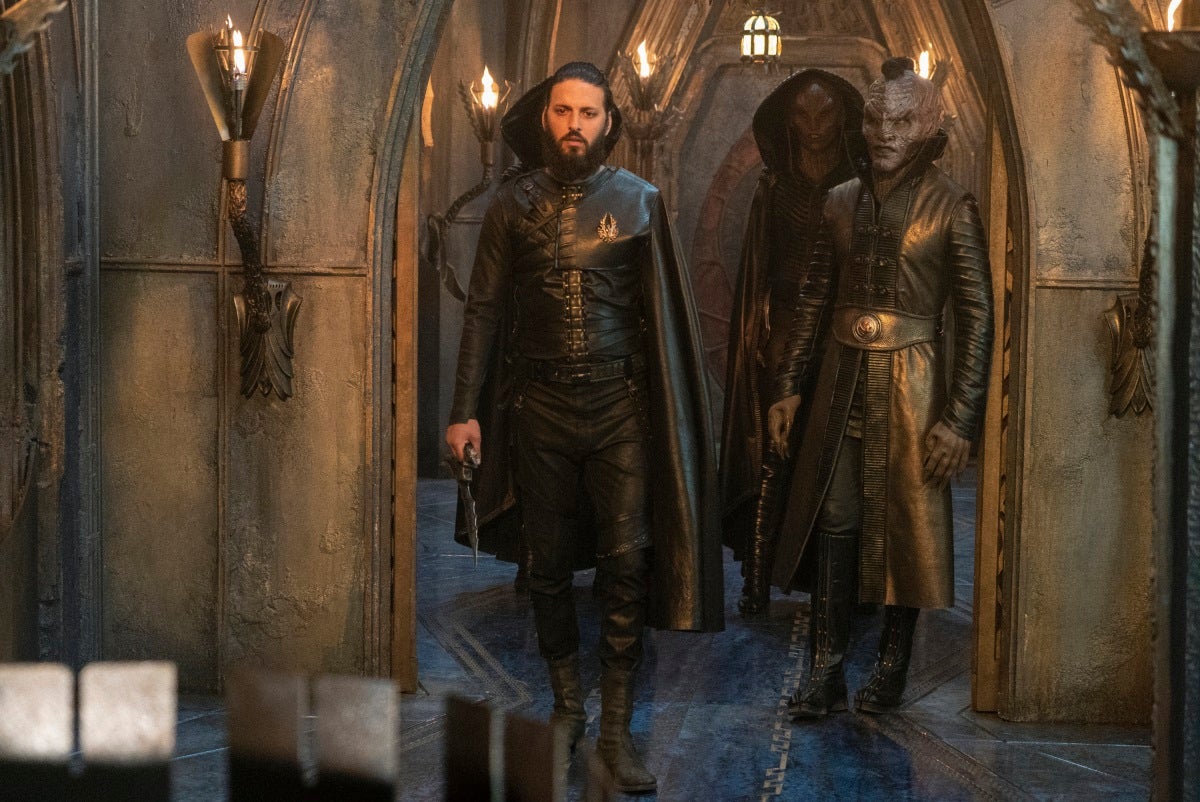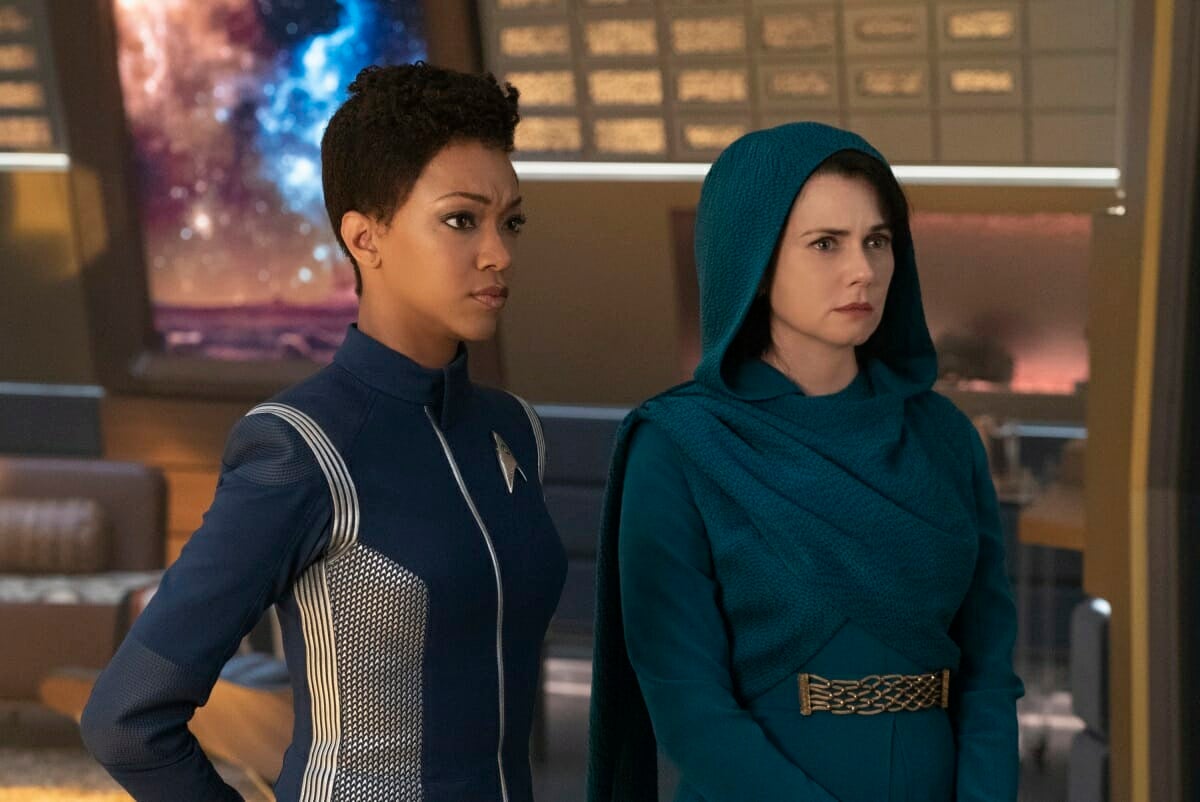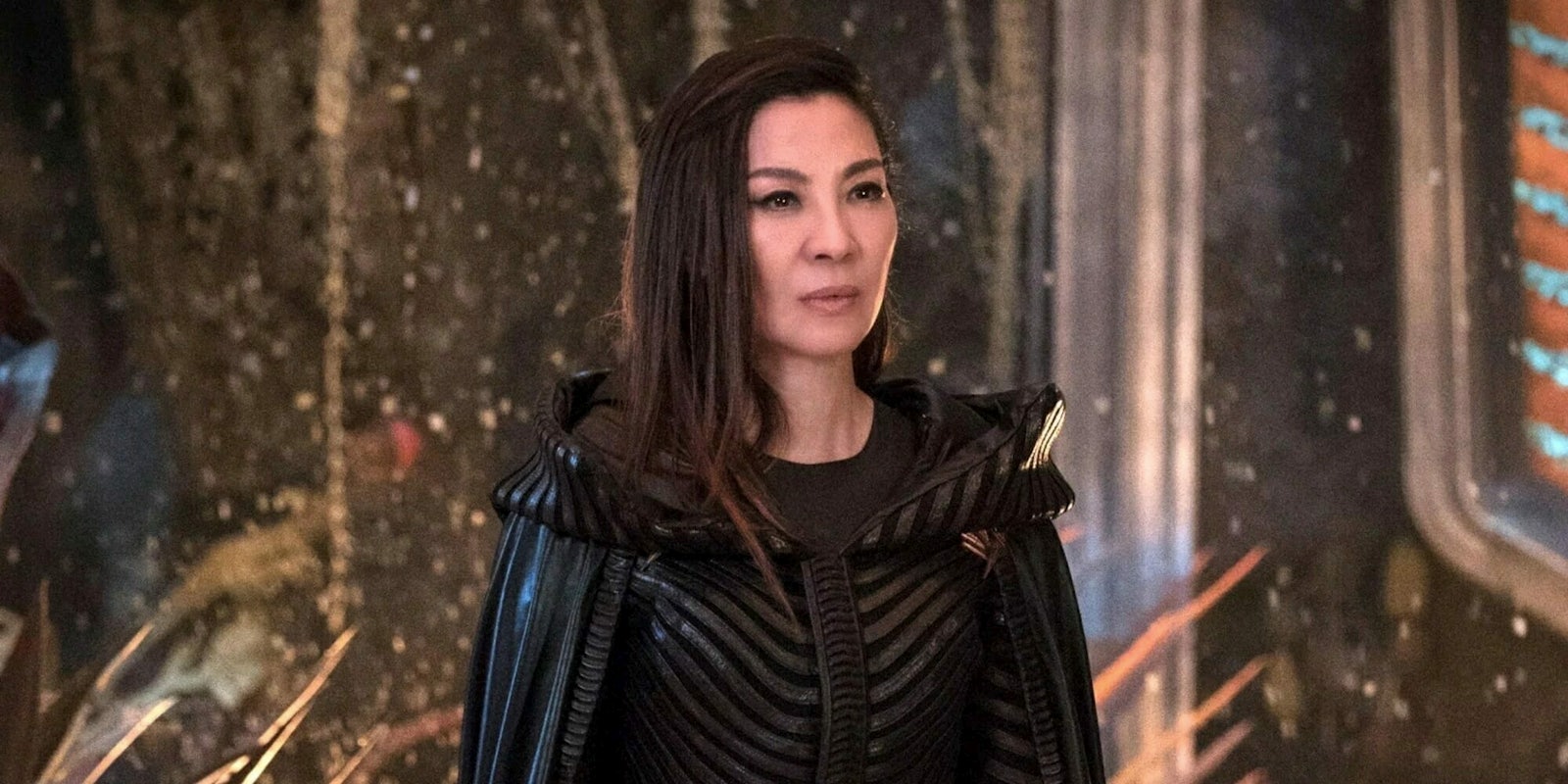For previous Star Trek: Discovery recaps, click here.
Star Trek: Discovery just crammed three episodes worth of Klingon drama into 20 minutes of screentime for its third episode—which may actually be a smart move.
As much as I think L’Rell’s Shakespearean machinations are great, I’m happy to avoid a multi-episode version of her love life. Her Klingon partner Voq spent most of last season believing he was the human Starfleet officer Ash Tyler, creating a split personality where one half remembers L’Rell as his lover, while the other sees her as his rapist. Plus, he’s now meant to be her obedient underling. Yikes.
Following two single-episode adventures, “Point of Light” dug into some ongoing arcs. Michael investigated Spock’s disappearance, Tilly clashed with the ghost she met last week, and we visited the post-war Klingon Empire. Including, yes, a pointed statement about the Klingons all having hair again.
Seven drops of blood
Your mileage may vary, but overwrought royal feuds are exactly what I hoped to see when Discovery gave the Klingons a central role. “Point of Light” featured an attempted coup, a secret baby, an epic orchestral score, and a scene where someone brandishes a severed head over a pit of lava. So much! Is going on!

L’Rell is the new Klingon Chancellor—a rarity in this male-dominated society—but the head of the House of Kor wants to usurp her. Challenging her leadership, he poetically describes the Red Angel signals as a bad omen: “Seven drops of blood, ready to rain down on us.” Despite their newly united empire, some Klingons openly disapprove of Voq/Tyler’s place as L’Rell’s right-hand man—a predictable outcome, because he still looks like a human: A human hipster with a ponytail and a beard, inexplicably wearing less armor than his tough Klingon peers. He’s like a soft little fish among lobsters.
In public, people see Voq/Tyler as the Chancellor’s alien boytoy. In private, their relationship is even more conflicted. Torn between his clashing identities, Voq/Tyler can’t give L’Rell what she wants: the original Voq, whose love she compares to an epic Klingon myth. “That intimacy… feels like violation,” he admits, shying away from a kiss. Their relationship is doomed, but then Tyler grabs onto a classic bad idea: Why not stay together for the kids? L’Rell secretly had Voq’s baby a few months ago, and now Voq/Tyler wants to help raise his son.
L’Rell sees the baby as a weakness, which turns out to be correct. A political rival kidnaps him as leverage, exhibiting a shocking lack of honor for a Klingon warrior. This absence of honor-related posturing is a big change from how Klingons are usually portrayed, positioning the Discovery-era Empire as cesspit of treachery and chaos. That is, unless Discovery’s writers are just ignoring a key element of Klingon culture. Either way, the attempted coup is interrupted by none other than Mirrorverse Georgiou (Michelle Yeoh), now representing Starfleet’s spy agency, Section 31.

Drawing on her own experience as an emperor, Georgiou points out that L’Rell and Voq/Tyler’s relationship is a strategic dead-end for L’Rell’s career. So they decide to fake Tyler and the baby’s deaths, allowing L’Rell to parade her personal sacrifice in front of the Klingon council while Tyler joins Section 31. I hoped he’d continue as a single dad (not least because Georgiou had an unexpectedly cute reaction to the baby), but no. Tyler abandons his son in a monastery, so we’ll never get to see him and Georgiou wiping baby vomit off their sexy leather outfits.
This episode was undeniably overstuffed, but Tyler’s arc is holding up much better than expected. Between Tyler’s sympathetic nature and Voq’s obsessive loyalty, you can see where the two halves of his personality converge. His loyalty to L’Rell seems almost self-imposed, desperately trying to do the right thing without truly loving her like Voq did. Meanwhile, his human side still gravitates toward Michael—who, to be brutally honest, should find a less stressful love interest.
Tilly’s ghost
Tilly is such a painful embodiment of workplace burnout that instead of realizing her ghost pal May Ahearn is a fungus parasite, she assumes that she’s a stress-induced hallucination. It’s a welcome chance for actress Mary Wiseman to dig into some serious drama, branching out from her usual role as wacky comic relief.
Since last week, May has evolved from a helpful friend to a malevolent stalker, hassling Tilly until she has a breakdown on the bridge. It takes Michael to deduce what’s up: May can’t be a hallucination because she doesn’t understand the concept of crying—something she’d know if she originated in Tilly’s brain. That’s quite a leap of logic, but whatever. Michael drags Tilly down to the fungus lab, where Stamets frustratingly fails to make the obvious connection May and the ghost of Hugh Culber. Come on!
Stamets quickly extracts the parasite from Tilly’s body, explaining that she must have picked it up in the Mirror Universe. This suggests that May is an evil counterpart of Ghost Culber, who emerged from the mycelial pathways of our own universe. Hopefully, Stamets or Tilly will figure this out next week, because the clues are all there, dammit!
Spock’s miserable childhood
Spock’s mother Amanda finally got a meaningful role this week, although I now feel like I made a wish on a monkey’s paw. I’ve long hoped that Discovery would shift focus from Sarek to Amanda, but in doing so, the show paints a bleak picture of Spock’s childhood.

Blocked from visiting Spock in his mental institution, Amanda steals his medical file and asks Michael for help. The plot thickens when Pike calls the hospital on her behalf, learning that Spock is wanted for the murder of three doctors. Hacking open his file, they find what basically amounts to a psychopathy diagnosis. “I was not a real mother,” says Amanda, blaming herself. Thanks to Sarek’s insistence on an emotionless upbringing, Amanda channelled her affection into Michael, neglecting her biological son. Allegedly.
This all sounds grim, but I’m taking it with a pinch of salt for now. Michael, Amanda, and Sarek offer different views of Spock’s life, and we still haven’t heard his own side of the story. We do, however, hear more about his childhood. He first saw a Red Angel as a kid (which surely suggests some kind of time-related shenanigans), starting when Michael ran away from home and an angel showed him where to find her.
Sadly, this all adds to my apprehension about Spock’s new role. As I said after the premiere, Spock already had a full character arc with Leonard Nimoy. Discovery is injecting more conflict by giving him a traumatic prologue, much like how J.J. Abrams transformed Kirk from a cheerful hero to an angsty rebel with daddy issues. Sure, we know that Sarek was a bad father, and that Vulcan society is racist. Maybe Spock did have a tumultuous youth before he found contentment with Kirk’s crew. But at the moment, this conflict feels reverse-engineered. Discovery needed a reason to give Spock a major role, and the writers decided on a miserable childhood with newly tense undertones to his parents’ marriage. It’s hard to see why this origin story is necessary, never mind enjoyable to watch.
For previous Star Trek: Discovery recaps, click here.
